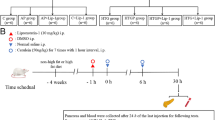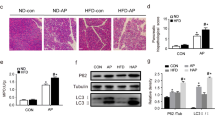Abstract
Background
Patients with hypertriglyceridemia (HTG) are prone to develop more severe acute pancreatitis (AP). However, the specific molecular mechanism still has not been elaborated clearly, and effective drugs for treating HTG-AP are not yet readily available. Baicalin is an ingredient isolated from a natural product that with potential to attenuate inflammation and pain in AP.
Aims
The aim of the present study was to explore the effect of baicalin on HTG-AP and the possible mechanism involved.
Methods
A mouse model of HTG-AP was successfully established by administering Poloxamer 407 and l-arginine intraperitoneally. We analyzed pathological changes, and performed TUNEL staining, DHE staining, and western blot to detect apoptosis, inflammation, oxidative stress, and B7H4/JAK2/STAT3 signaling in the pancreas.
Results
Treatment with baicalin decreased serum triglyceride, cholesterol, lipase, amylase levels, and attenuated pancreatic edema. After intervention with baicalin, apoptosis and inflammation in HTG-AP mice were alleviated, as indicated by the decrease of Bax, cleaved-caspase-3, IL-6, TNF-α, and IL-1β. Baicalin also alleviated oxidative stress by decreasing NOX2, increasing SOD2 protein expression, and regulating Nrf2/Keap1 signaling in HTG-AP mice. Furthermore, baicalin decreased the upregulated B7H4/JAK2/STAT3 pathway in HTG-AP.
Conclusions
In conclusion, our data suggested that baicalin could attenuate HTG-AP, possibly through regulating B7H4/JAK2/STAT3 signaling.





Similar content being viewed by others
References
Faghih M, Singh VK. Do elevated triglycerides truly trigger acute pancreatitis? Dig Dis Sci 2019;64:616–618.
Nawaz H, Koutroumpakis E, Easler J et al. Elevated serum triglycerides are independently associated with persistent organ failure in acute pancreatitis. Am J Gastroenterol 2015;110:1497–1503.
Lankisch PG, Apte M, Banks PA. Acute pancreatitis. Lancet 2015;386:85–96.
Xiao AY, Tan ML, Wu LM et al. Global incidence and mortality of pancreatic diseases: a systematic review, meta-analysis, and meta-regression of population-based cohort studies. Lancet Gastroenterol Hepatol 2016;1:45–55.
Zhou Q, Tao X, Xia S et al. T lymphocytes: a promising immunotherapeutic target for pancreatitis and pancreatic cancer? Front Oncol 2020;10:382.
Demols A, Le Moine O, Desalle F et al. CD4(+)T cells play an important role in acute experimental pancreatitis in mice. Gastroenterology 2000;118:582–590.
Huang J, Wu Z, Lu S et al. Soluble B7–H2 as a novel marker in early evaluation of the severity of acute pancreatitis. Lab Med 2015;46:109–117.
Zhuang X, Shen J, Jia Z et al. Anti-B7-H3 monoclonal antibody ameliorates the damage of acute experimental pancreatitis by attenuating the inflammatory response. Int Immunopharmacol 2016;35:1–6.
Xu R, Gong J, Chen W, Jin Y, Huang J. Soluble B7–H5 is a novel diagnostic, severity, and prognosis marker in acute pancreatitis. Biomed Res Int 2021;2021:1223850.
Prasad DV, Richards S, Mai XM, Dong C. B7S1, a novel B7 family member that negatively regulates T cell activation. Immunity 2003;18:863–873.
Sica GL, Choi IH, Zhu G, Tamada K, Wang SD, Tamura H, Chapoval AI, Flies DB, Bajorath J, Chen L. B7–H4, a molecule of the B7 family, negatively regulates T cell immunity. Immunity 2003;18:849–861.
Radichev IA, Maneva-Radicheva LV, Amatya C et al. Nardilysin-dependent proteolysis of cell-associated VTCN1 (B7–H4) marks type 1 diabetes development. Diabetes 2014;63:3470–3482.
Che F, Heng X, Zhang H et al. Novel B7-H4-mediated crosstalk between human non-Hodgkin lymphoma cells and tumor-associated macrophages leads to immune evasion via secretion of IL-6 and IL-10. Cancer Immunol Immunother 2017;66:717–729.
Chen X, Wang L, Wang W, Zhao L, Shan B. B7–H4 facilitates proliferation of esophageal squamous cell carcinoma cells through promoting interleukin-6/signal transducer and activator of transcription 3 pathway activation. Cancer Sci 2016;107:944–954.
Yao Y, Ye H, Qi Z et al. B7–H4(B7x)-Mediated cross-talk between glioma-initiating cells and macrophages via the IL6/JAK/STAT3 pathway lead to poor prognosis in glioma patients. Clin Cancer Res 2016;22:2778–2790.
Wang Q, Bai L, Luo S et al. TMEM16A Ca(2+)-activated Cl(-) channel inhibition ameliorates acute pancreatitis via the IP3R/Ca(2+)/NFkappaB/IL-6 signaling pathway. J Adv Res 2020;23:25–35.
Ren Y, Liu W, Zhang L et al. Milk fat globule EGF factor 8 restores mitochondrial function via integrin-medicated activation of the FAK-STAT3 signaling pathway in acute pancreatitis. Clin Transl Med 2021;11:e295.
Qin MZ, Qin MB, Liang ZH, Tang GD. Effect of SOCS3 on lung injury in rats with severe acute pancreatitis through regulating JAK2/STAT3 signaling pathway. Eur Rev Med Pharmacol Sci 2019;23:10123–10131.
Han C, Du D, Wen Y et al. Chaiqin chengqi decoction ameliorates acute pancreatitis in mice via inhibition of neuron activation-mediated acinar cell SP/NK1R signaling pathways. J Ethnopharmacol 2021;274:114029.
Crockett SD, Wani S, Gardner TB, Falck-Ytter Y, Barkun AN. American Gastroenterological Association Institute Clinical Guidelines C: American Gastroenterological Association Institute Guideline on Initial Management of Acute Pancreatitis. Gastroenterology 2018;154:1096–1101.
Li L, Jin T, Wen S et al. Early rapid fluid therapy is associated with increased rate of noninvasive positive-pressure ventilation in hemoconcentrated patients with severe acute pancreatitis. Dig Dis Sci 2020;65:2700–2711.
Xiping Z, Guanghua F, Jinxian H et al. Baicalin protects thymus of rats with severe acute pancreatitis. Inflammation 2010;33:157–165.
Tian H, Zhang X, Wu C et al. Effects of Baicalin and Octreotide on the serum TNF-alpha level and apoptosis in multiple organs of rats with severe acute pancreatitis. Inflammation 2009;32:191–201.
Fan J, Duan L, Wu N et al. Baicalin ameliorates pancreatic fibrosis by inhibiting the activation of pancreatic stellate cells in mice with chronic pancreatitis. Front Pharmacol 2020;11:607133.
Jingmin O, Xiping Z, Chun W, Ping Y, Qian Y. Study of dexamethasone, baicalin and octreotide on brain injury of rats with severe acute pancreatitis. Inflamm Res 2012;61:265–275.
Dai J, Jiang M, Hu Y et al. Dysregulated SREBP1c/miR-153 signaling induced by hypertriglyceridemia worsens acute pancreatitis and delays tissue repair. JCI Insight 2021;6:e138584.
Yang X, Zhao K, Deng W et al. Apocynin attenuates acute kidney injury and inflammation in rats with acute hypertriglyceridemic pancreatitis. Dig Dis Sci 2020;65:1735–1747.
Zhen J, Chen W, Liu Y, Zang X. Baicalin protects against acute pancreatitis involving JNK signaling pathway via regulating miR-15a. Am J Chin Med 2021;49:147–161.
Jin HZ, Yang XJ, Zhao KL et al. Apocynin alleviates lung injury by suppressing NLRP3 inflammasome activation and NF-kappaB signaling in acute pancreatitis. Int Immunopharmacol 2019;75:105821.
Wen Y, Han C, Liu T et al. Chaiqin chengqi decoction alleviates severity of acute pancreatitis via inhibition of TLR4 and NLRP3 inflammasome: identification of bioactive ingredients via pharmacological sub-network analysis and experimental validation. Phytomedicine 2020;79:153328.
Zhao ZF, Zhang Y, Sun Y, Zhang CH, Liu MW. Protective effects of baicalin on caerulein-induced AR42J pancreatic acinar cells by attenuating oxidative stress through miR-136-5p downregulation. Sci Prog 2021;104:368504211026118.
Kong N, Chen X, Feng J et al. Baicalin induces ferroptosis in bladder cancer cells by downregulating FTH1. Acta Pharm Sin B 2021;11:4045–4054.
Zaghloul RA, Zaghloul AM, El-Kashef DH. Hepatoprotective effect of Baicalin against thioacetamide-induced cirrhosis in rats: targeting NOX4/NF-kappaB/NLRP3 inflammasome signaling pathways. Life Sci 2022;295:120410.
Cai X, Shi Y, Dai Y et al. Baicalin clears inflammation by enhancing macrophage efferocytosis via inhibition of RhoA/ROCK signaling pathway and regulating macrophage polarization. Int Immunopharmacol 2022;105:108532.
Li Y, Liu T, Li Y et al. Baicalin ameliorates cognitive impairment and protects microglia from LPS-induced neuroinflammation via the SIRT1/HMGB1 pathway. Oxid Med Cell Longev 2020;2020:4751349.
Ishfaq M, Wu Z, Wang J et al. Baicalin alleviates Mycoplasma gallisepticum-induced oxidative stress and inflammation via modulating NLRP3 inflammasome-autophagy pathway. Int Immunopharmacol 2021;101:108250.
Gao W, Xu B, Zhang Y et al. Baicalin attenuates oxidative stress in a tissue-engineered liver model of NAFLD by scavenging reactive oxygen species. Nutrients 2022;14:541.
Xu J, Li S, Jiang L et al. Baicalin protects against zearalenone-induced chicks liver and kidney injury by inhibiting expression of oxidative stress, inflammatory cytokines and caspase signaling pathway. Int Immunopharmacol 2021;100:108097.
Yang S, Song Y, Wang Q et al. Daphnetin ameliorates acute lung injury in mice with severe acute pancreatitis by inhibiting the JAK2-STAT3 pathway. Sci Rep 2021;11:11491.
Funding
This work was supported by National Natural Science Foundation of China (No. 81900740), Scientific Research Funding of Tianjin Medical University Chu Hsien-I Memorial Hospital (No. ZXY-YJJ2021-4), and Tianjin Health Commission Science and Technology Project (No. QN20025).
Author information
Authors and Affiliations
Contributions
JX and JL contributed to research design and critical revision of the manuscript. JY and FH contributed to the design of study, conduction of the experiment and the manuscript draft. GW contributed to research design, discussion of results, and performed data analysis. YD and HS were responsible in the assistance of the completion of the experiments.
Corresponding author
Ethics declarations
Conflict of interest
The authors declare that there is no conflict of interests.
Ethical approval
The ethics governing the use and conduct of experiments on animals were strictly observed, and the experimental protocol was approved by the Experimental Animal Ethical Committee of Tianjin Medical University (Approval NO. DXBYY-IACUC-2022044).
Additional information
Publisher's Note
Springer Nature remains neutral with regard to jurisdictional claims in published maps and institutional affiliations.
Rights and permissions
About this article
Cite this article
Yang, J., Han, F., Wu, G. et al. Dysregulated B7H4/JAK2/STAT3 Pathway Involves in Hypertriglyceridemia Acute Pancreatitis and Is Attenuated by Baicalin. Dig Dis Sci 68, 478–486 (2023). https://doi.org/10.1007/s10620-022-07606-5
Received:
Accepted:
Published:
Issue Date:
DOI: https://doi.org/10.1007/s10620-022-07606-5




